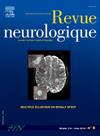Can a virtual reality tool detect minor executive functions impairment in patients with multiple sclerosis?
IF 2.3
4区 医学
Q2 CLINICAL NEUROLOGY
引用次数: 0
Abstract
Introduction
Traditional neuropsychological tests do not always identify executive disorders in patients with multiple sclerosis (MS), despite their complaints. Many studies suggest that virtual reality (VR) may be useful to evaluate cognitive functions as close as possible to patients’ daily activities. We investigated the validity of a VR tool in the assessment of executive impairment in MS patients.
Methods
Thirty patients with relapsing-remitting multiple sclerosis (RRMS) and 30 matched healthy controls performed a shopping task using the Virtual Action Planning-Supermarket (VAP-S) which simulates a supermarket environment (main measures: total test duration, distance traveled, incorrect actions, number of stops, duration of stops and time to pay) with a familiarization phase followed by a test phase. In addition, neuropsychological tests assessing executive functions were proposed. Inter-group comparisons were conducted using adapted statistical tests and correlation analyses between the VAP-S and the traditional tests results were performed.
Results
No significant difference was observed between the two groups in traditional tests. However, during the VAP-S familiarization phase, RRMS patients performed worse than controls, showing differences in distance traveled (P = 0.042), total test duration (P = 0.021) and number of stops (P = 0.034). In the VAP-S test phase, no difference was found. Correlations were observed between some of the VAP-S scores and traditional tests results in both groups.
Conclusion
A VR tool appears to be more effective than traditional tests in detecting mild executive difficulties in MS patients. We noticed a learning effect during the test phase, suggesting that VR could support cognitive rehabilitation and improve daily living.
虚拟现实工具能否检测多发性硬化症患者的轻微执行功能障碍?
传统的神经心理学测试并不总是识别多发性硬化症(MS)患者的执行障碍,尽管他们的抱怨。许多研究表明,虚拟现实(VR)可能有助于评估尽可能接近患者日常活动的认知功能。我们调查了VR工具在评估多发性硬化症患者执行功能障碍中的有效性。方法:30例复发-缓解型多发性硬化症(RRMS)患者和30例匹配的健康对照者使用虚拟行动计划-超市(vv - s)进行购物任务,该虚拟行动计划-超市模拟超市环境(主要测量指标:总测试时间、行进距离、错误行为、停车次数、停车时间和付款时间),并进行熟悉阶段和测试阶段。此外,还提出了评估执行功能的神经心理测试。采用适应性统计检验进行组间比较,并对VAP-S与传统检验结果进行相关性分析。结果:两组在传统试验中差异无统计学意义。然而,在VAP-S熟悉阶段,RRMS患者的表现比对照组差,表现出旅行距离(P=0.042),总测试时间(P=0.021)和停止次数(P=0.034)的差异。在VAP-S测试阶段,没有发现差异。在两组中观察到一些VAP-S评分与传统测试结果之间的相关性。结论:在检测MS患者轻度执行困难方面,VR工具似乎比传统测试更有效。在测试阶段,我们注意到一个学习效果,这表明VR可以支持认知康复和改善日常生活。
本文章由计算机程序翻译,如有差异,请以英文原文为准。
求助全文
约1分钟内获得全文
求助全文
来源期刊

Revue neurologique
医学-临床神经学
CiteScore
4.80
自引率
0.00%
发文量
598
审稿时长
55 days
期刊介绍:
The first issue of the Revue Neurologique, featuring an original article by Jean-Martin Charcot, was published on February 28th, 1893. Six years later, the French Society of Neurology (SFN) adopted this journal as its official publication in the year of its foundation, 1899.
The Revue Neurologique was published throughout the 20th century without interruption and is indexed in all international databases (including Current Contents, Pubmed, Scopus). Ten annual issues provide original peer-reviewed clinical and research articles, and review articles giving up-to-date insights in all areas of neurology. The Revue Neurologique also publishes guidelines and recommendations.
The Revue Neurologique publishes original articles, brief reports, general reviews, editorials, and letters to the editor as well as correspondence concerning articles previously published in the journal in the correspondence column.
 求助内容:
求助内容: 应助结果提醒方式:
应助结果提醒方式:


